
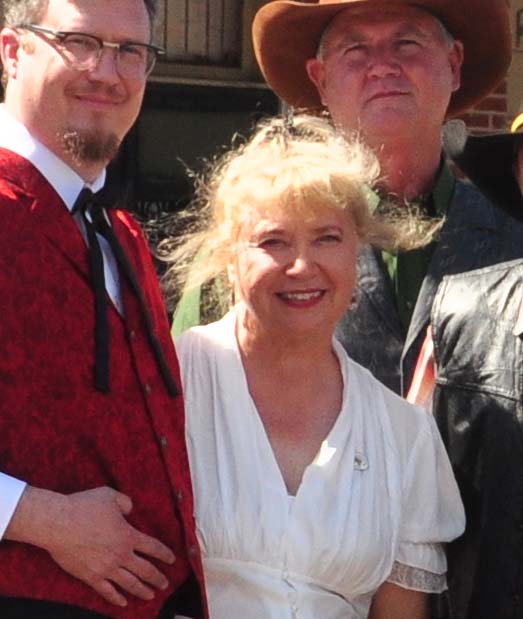 Putting
on a Reenactment - Part Seven
Putting
on a Reenactment - Part Seven
Part Seven: Rehearsing the Reenactment
In October, anything can happen in Texas. The day for rehearsing the reenactment we were putting on for my hometown’s 150th anniversary began hot and would eventually hit 90 degrees. We had prayed for no rain or high winds. I wish we had also prayed the temperature would stay in the 70s.
Most of the props had already been stored in the old depot building its owner had kindly let us use. On the other end of town, my Arizona gunfighter and his partner would set up an old-time photography booth complete with costumes in a building owned by the historical society. Having been burned by a previous revisionist reenactment done years before, the society had been against us but couldn’t completely wiggle out of an obligation my cousin had made with them months earlier to rent the building.
One of the officers of the historical society who was on our side opened the doors while I went to the depot building and began dragging out props. People began helping, with everyone asking me at the same time, “Where does this go?” I soon saw that sunlight was beating through the banners I had used for signs over the stores and saloons, making them look too artificial. It was too late to paint the backs black.
While I was trying to sort props out, someone came running to tell me the news that the historical society had ripped out the toilet so we couldn’t use it. A new toilet was sitting there, but no effort had been made to put it in. The port-a-potties we had rented for Saturday had been delivered early, so it wasn’t a total disaster. But it would mean the photographer and her customers would have to take a hike to use the other facilities. One of the committee members got on the phone to her son, and he came down to install the new toilet.
I had thirty-some-odd people arriving to rehearse, and I didn’t have time to do anything but shake my head and move on. We were still short of actors. A couple of the reenactors agreed to play two parts. Some locals would wear one hat playing an outlaw, then change hats to play a vigilante. One man would sing his heart out, then go out to play a screaming and infuriated rancher—performing with part of a lung removed. It was like that. A few had fought cancer. One was due for heart surgery. Many of the reenactors were older, retired men who refused to sit in a recliner and die a slow death.
Since it was so hot, I had told the reenactors they didn’t have to come in full costume for rehearsal. That proved another mistake. The videographer arrived and filmed part of the rehearsal. If they had been in costume, he would have much more film to work with.
 The
street and sidewalk filled with milling people. Several
volunteers wouldn’t be arriving until the next day, as would
the horsemen, but it was still a gigantic lot of people. The
girl singer had found a version of “Can’t Help Loving That Man
of Mine” online that she could sing to, but we couldn’t figure
how to get it from her phone to a speaker.
The
street and sidewalk filled with milling people. Several
volunteers wouldn’t be arriving until the next day, as would
the horsemen, but it was still a gigantic lot of people. The
girl singer had found a version of “Can’t Help Loving That Man
of Mine” online that she could sing to, but we couldn’t figure
how to get it from her phone to a speaker.
I had sent everyone the scripts in advance and handed out almost every part ahead of time. The narrator would describe most of what was going on and why, but there were some speaking parts. We had several scenes leading up to the big shootout with songs between each of the scenes. We had school children who were supposed to carry around signs announcing each act.
There is little I can say about the rehearsal except that it was almost a total disaster. Many of the reenactors were prepared and knew what they were supposed to do—it was evident that just as many others had never bothered to download the script and read it. Fortunately, I had printed hard copies for every player. I had a confusing mass of people who didn’t know what they were supposed to do. I did the best I could to bring about some kind of order and carry on.
The script, especially the shootout, had been written as closely as I could get to the actual events. One older man, who had confided to me that after battling cancer, doing things like this was the only thing that kept him from sinking into deep depression, wasn’t able to fall down on the ground after being shot. That was an easy fix—he could sink into one of the prop chairs. When some reenactors questioned me about the fight scenes in the script, I told them not to worry about every detail of it but to work out between themselves the safest way to do their parts.
The heat was terrible and exhausted all of us. After going through the reenactment several times with everyone just seeming to bumble around not knowing what they were doing, I finally gave up and called it quits. I sat on the edge of the tall sidewalk and sighed. One of the younger reenactors joined me. “That was pretty bad. Most people are only interested in the shooting anyway.”
“I can’t go back now. It is what it is,” I replied. Instead of being upset, I found myself resigned.
That evening, as I looked over the day’s events, I chastised myself for writing too complicated of a script with far too many players in it. I had been a rotten director, taking too much for granted and not communicating effectively with my players.
I remembered a little play I had participated in at a Western Writers of America convention. I had botched my part badly, entering too soon and having to exit in a gale of laughter. Because it was a comedy, it didn’t matter that I could turn it into something funny and have everyone laughing. But I had bungled. There were other people who had nailed their parts during rehearsal, and then when they got on stage for the real thing, looked like a deer with a truck coming at them. I remembered the old theater adage, “Bad dress rehearsal, good opening night.”
And I thought about all the people who had given up their time and driven so far, one of them even from out of state, to participate in our 150th celebration, and I realized how blessed we were to have them.
That night, I sent emails truthfully telling them they had been wonderful, and I was looking forward to the performance the next day.
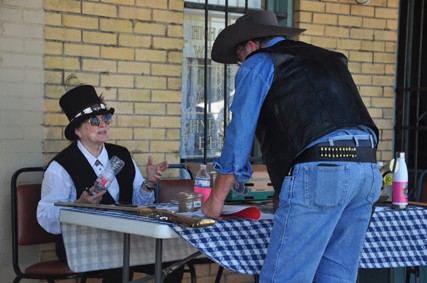
Mollie Davis handed out scripts and had everyone sign a release form. There was considerable concern about being held responsible for accidents, and that’s one reason why my name appeared on everything—of all the committee members, I had the least to lose.
A director
should always wear a hat of some kind because it denotes
authority and makes him or her instantly recognizable.
Unfortunately, I look terrible in hats and opted instead to
wear a distinctive Texas flag shirt. Reenactors Clyde Baker
and Rod Timanus sit on the bench. Clyde would portray Tom
Bishop, owner of the meat market, and Rod would play George
Milton, storeowner. The wooden structure indicates the doorway
of the store where the outlaws would try to corner George
Milton as they attacked Bishop outside. Fred Wilson, the
narrator, stands looking over the script. In the left front,
Johnny Klemm and his wife Mimi, in the red dress, watch the
action. Forrest McDavid, one of the cousins I roped in, sits
to the right.

Steve von Roeder would serve as our armorer. He checked every gun to make sure it was either unloaded or loaded with blanks. The Friday after our reenactment, I was on my way to Fort Worth to a book signing when I got a call from another committee member. Had I heard the news? Indeed, I had, and we both breathed huge sighs of relief that it had happened after our reenactment and not before. When I thought about all the precautions our reenactors had insisted on, I grew so angry about the actor/producer’s arrogance that had resulted in such a catastrophe on a movie set. But it was an anger rooted in fear. Had I not been surrounded by such knowledgeable and dedicated people—it could had been me.
The examining trial notes do not mention saloon girls, but one can’t have a reenactment without them. They saved the day by saying lines that we didn’t have enough male actors to perform.
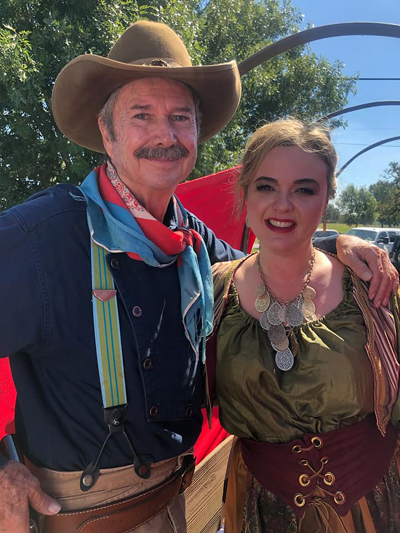
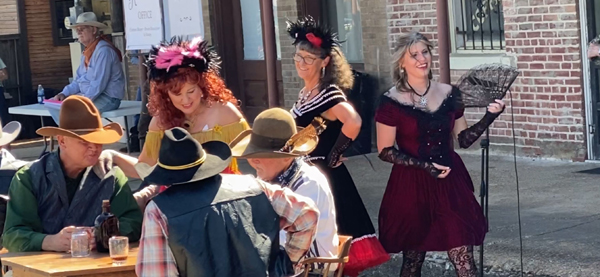
Coming up in Part
Eight: Show Time!
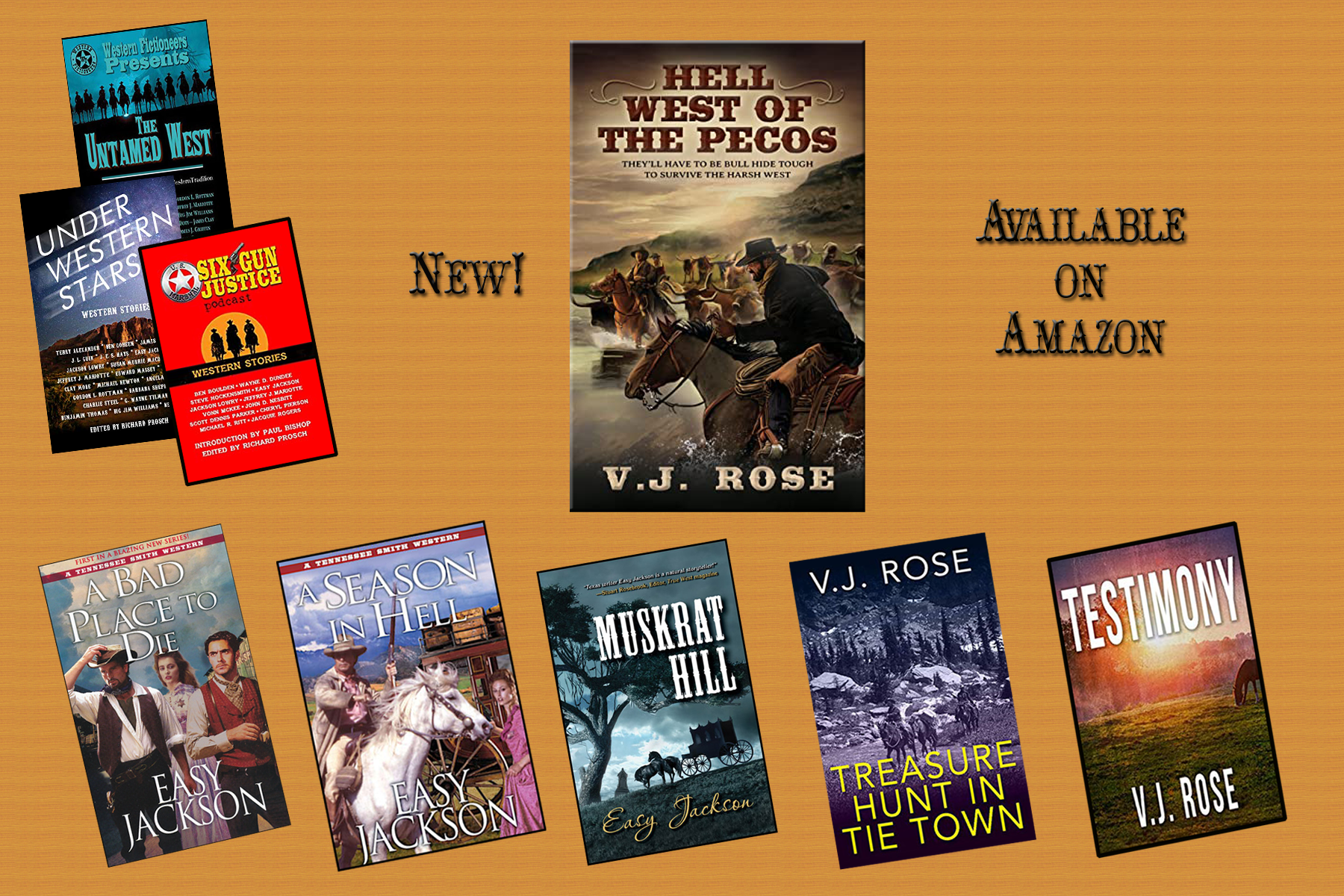
Books:
A broke Texas rancher risks all to drive longhorns through the wilds of West Texas to sell to the government in New Mexico, but he’s hindered by the feuding relatives and green cowboys he is forced to hire as drovers.
A BAD PLACE TO DIE and A SEASON IN HELL
Tennessee
Smith becomes the reluctant stepmother of three rowdy stepsons and
the town marshal of Ring Bit, the hell-raisingest town in Texas.
A little boy finds a new respect for his father when he helps him solve a series of brutal murders in a small Texas town.
A
rancher takes his nephews on an adventurous hunt for buried
treasure that lands them in all sorts of trouble.
Two
lonely people hide secrets from one another in a May-December
romance set in the modern-day West.
Short Stories:
WOLFPACK
PUBLISHING - "A
Promise Broken - A Promise Kept"
A
woman accused of murder in the Old West is defended by a
mysterious stranger.
THE UNTAMED WEST – “A Sweet Talking Man”
A sassy stagecoach station owner fights off outlaws with the help of a testy, grumpy stranger. A Will Rogers Medallion Award Winner.
UNDER WESTERN STARS - "Blood Epiphany"
A broke Civil War veteran's wife has left him; his father and brothers have died leaving him with a cantankerous old uncle, and he's being beaten by resentful Union soldiers. At the lowest point in his life, he discovers a way out, along with a new thankfulness. A Will Rogers Medallion Award Winner.
SIX-GUN JUSTICE WESTERN STORIES – “Dulcie’s Reward”
Seventeen-year-old
Dulcie is determined to find someone to drive her cattle to the
new market in Abilene.
"The decision to do a reenactment."
"Doing research for the reenactment."
"Sorting out the truth to make a historically accurate reenactment."
"Who's firing the guns?"
"Finding experienced reenactors."
"Organizing a reenactment - coming down to the wire."
"Rehearsing the reenactment."
"Show time!"